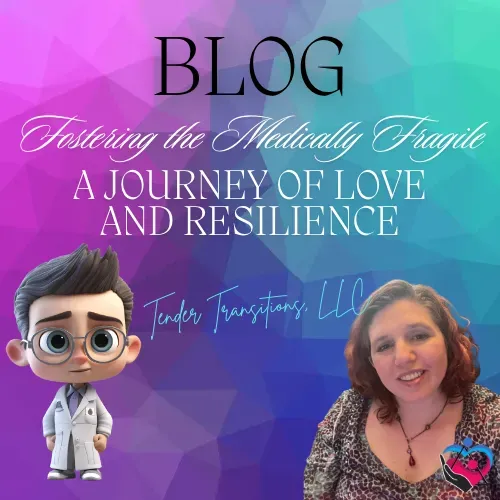Training Requirements for a Medically Fragile Foster Caregiver
Becoming a foster parent is a profound commitment, and when the child in your care has complex medical needs, the responsibility grows even more significant. Medically fragile children require specialized care that goes beyond typical foster parenting, demanding a unique set of skills and knowledge. To ensure that foster parents are equipped to provide the best possible care, specific training requirements are essential. This blog post will explore the key training components necessary for a medically fragile foster caregiver and highlight how this training prepares you to handle the complexities of caring for a child with significant health needs.
1. Understanding Complex Medical Conditions
The first step in training for medically fragile foster care involves understanding the various complex medical conditions that these children may have. This includes:
Medical Knowledge:
Foster parents need to gain a basic understanding of the medical conditions that their foster child may have. This knowledge includes recognizing symptoms, understanding treatment plans, and knowing how to respond in emergencies.
Medical Terminology:
Familiarity with medical terminology is crucial for effective communication with healthcare professionals. Training will help you learn and understand terms related to the child’s condition, treatments, and medications.
Condition-Specific Training:
Each child’s medical needs are unique, so training often includes information specific to the child’s condition. This might involve understanding how to manage diabetes, handle respiratory issues, or use specialized medical equipment.
2. Medication Management
Proper medication management is a critical aspect of caring for medically fragile children. Training in this area typically covers:
Administration of Medications:
Foster parents must learn how to correctly administer various forms of medication, including oral, injectable, and topical. Training ensures that you can handle these tasks safely and effectively.
Understanding Dosage and Schedules:
Accurate dosage and timing are crucial for managing a child’s medical condition. Training will include how to follow prescribed schedules and adjust dosages as needed.
Handling Side Effects:
Recognizing and managing potential side effects is essential. Training will teach you how to monitor for side effects and when to contact a healthcare provider.
3. Medical Equipment and Technology
Many medically fragile children use specialized medical equipment. Training will cover a number of things.
Equipment Operation:
Foster parents will receive instruction on how to operate medical equipment such as ventilators, feeding tubes, or heart monitors. This includes understanding how to set up, maintain, and troubleshoot equipment.
Maintenance and Sterilization:
Proper maintenance and sterilization of medical equipment are crucial for preventing infections and ensuring proper function. Training will cover how to clean and store equipment safely.
Emergency Procedures:
In case of equipment failure or malfunction, knowing how to respond is vital. Training will provide guidelines on handling emergencies and when to seek professional help.
4. Care Coordination and Documentation
Effective care coordination and thorough documentation are vital components of managing the needs of medically fragile children:
Coordinating with Healthcare Providers:
Training will emphasize how to work with a child’s medical team, including scheduling appointments, sharing information, and following treatment plans.
Record Keeping:
Keeping accurate records of medical treatments, medications, and appointments is essential. Training will teach you how to document this information properly and maintain organized records.
Emergency Protocols:
Understanding and implementing emergency protocols, such as what to do in a medical crisis or how to handle sudden changes in a child’s condition, is a key part of training.
5. Emotional and Psychological Support
Caring for a medically fragile child involves emotional and psychological challenges. Training often includes three basic categories.
Emotional Resilience:
Foster parents will learn strategies for managing stress and maintaining emotional resilience. This includes self-care techniques and accessing support when needed.
Supporting the Child’s Emotional Well-being:
Training will cover how to provide emotional support to the child, helping them cope with their medical condition and associated stress.
Family Dynamics:
Training will address how to manage family dynamics, including the impact of a medically fragile child on other family members and strategies for maintaining a balanced household.
6. Legal and Ethical Considerations
Foster parents must be aware of the legal and ethical aspects of caring for medically fragile children.
Informed Consent:
Training will cover the process of obtaining informed consent for medical treatments and procedures. Understanding your role in this process is crucial for legal and ethical caregiving.
Privacy and Confidentiality:
Adhering to privacy laws and maintaining confidentiality regarding the child’s medical information are essential. Training will provide guidelines on handling sensitive information.
Advocacy:
As a foster parent, advocating for the child’s needs within the healthcare system is important. Training will teach you how to effectively advocate for necessary services and treatments.
7. Continuous Education and Support
Training for medically fragile foster care is an ongoing process. There are a few ways to fit in this education.
Refresher Courses:
Regular refresher courses and updates on new medical practices and technologies help keep your skills current.
Support Networks:
Engaging with support networks and connecting with other foster parents who care for medically fragile children can provide additional resources and shared experiences.
Professional Guidance:
Accessing guidance from healthcare professionals, such as nurses or caseworkers, can provide ongoing support and address any questions or concerns that arise.
Conclusion
Training to become a medically fragile foster caregiver is an essential and comprehensive process that prepares you to handle the complexities of caring for children with significant medical needs. By acquiring knowledge in medical conditions, medication management, equipment operation, and emotional support, you will be equipped to provide high-quality care and make a meaningful difference in the lives of medically fragile children. This specialized training not only enhances your ability to meet the child’s needs but also supports you in managing the challenges that come with foster parenting. If you are considering this path, know that your dedication and preparedness are vital to providing the care and stability these children need to thrive.

